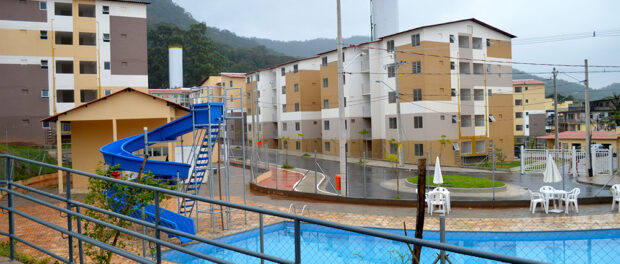
For the original in Portuguese by Vladimir Platonow, published in Agência Brasil, click here.
Nearly a week after the confrontation between residents of Vila Autódromo and municipal guards in Jacarepaguá, near the future Olympic Village, the community mobilized once again on June 8. At the same site, they denounced the practices of the Municipal Solicitor General who residents say has acted inappropriately towards residents in dispossession negotiations. Residents also complained that the properties of Parque Carioca—the public housing complex to which many residents were removed, built by the Rio city government in partnership with Caixa Econômica Federal—are uninhabitable.
On Wednesday, June 3, the City attempted to demolish a house in which five people were living in Vila Autódromo, on the banks of the Jacarepaguá Lagoon, defying a decision by the State Court of Justice, according to the State of Rio’s Public Defender’s Office. The family and neighbors resisted the demolition, and several ended up wounded by batons and rubber bullets.
The house belongs to motorist Ocimar da Silva Miranda, 46, who lives with his wife and two daughters, 3 and 6 years old, as well as his elderly father, in a 60m2 home. According to Ocimar’s wife, Melry Nascimento Brito, 37, the City is offering a very low price as compensation for the property, R$122,000 ($US40,000), and is attempting to coerce the residents in negotiations.
“I don’t accept this price. I requested that [the solicitor responsible for the negotiations] pay me what’s fair, so I can find a better place. He responded by saying that since we were already accustomed to living in a favela, it shouldn’t make any difference to us,” recalled Melry. “He humiliates people. With this price, I won’t be able to find any property that is big enough for us, neither close by nor far away.”
Marcel Silva Marques, the solicitor responsible for the negotiation, could not be reached by Agência Brasil. In a written response, the Municipal Solicitor General’s Office denied that he had applied subjective criteria in evaluating the properties and that he had acted inappropriately. “The appraisal of properties to establish the compensation value is done by specialized engineers and architects, experienced in evaluations, and it follows a pattern,” read the note.
Unlike Melry and Ocimar, Letícia Silva Alvez, 26, accepted an offer to trade her house in the community for a property in the Minha Casa Minha Vida (MCMV) federal housing program, in Parque Carioca. However, as a result of structural problems in the new apartment, she moved back to live with her father and two daughters in Vila Autódromo less than 6 months later.
“I received an apartment with three bedrooms, a living room, kitchen, bathroom and a small balcony. But the work was all poorly done. In the bathroom, plaster is falling and a hole is opening up. In the kitchen, water comes through the floor, the drains are all blocked and all sorts of things come back up—rice, beans. If you try to close the drain, it shoots back up like a fountain,” says Letícia, who does not know whom she should call for help. Caixa Econômica, responsible for the venture, did not clarify the state of repairs—if they planned to do them, or if they were already underway.
In Vila Autódromo, among the 150 families resisting relocation–from the 450 that originally lived there–is the family of 50-year-old Maria da Penha Macedo. She was among those injured in last week’s confrontation. She intervened because she found the removal of her neighbor Ocimar to be unjust. “They were two children and a senior citizen. Where would they go on such short notice?” she asked.
For Maria da Penha, who also does not want to leave Vila Autódromo, the money the City is giving for compensation will not buy a better place to live. “I’m used to the comfort of a backyard—in my home, we have plants that bear fruit: mango, guava, acerola, avocado. You can even sunbathe. I mean, I live well. I have my house, which I built with sacrifice. Why would I have to leave to go live in an apartment where they don’t even have an elevator? I’m getting old,” she says.
The Public Defender accompanied the families and is hoping for meetings with the City and Solicitor General in the Court of Justice, in an attempt to rectify the situation. For the time being, the judicial decision obtained by the Public Defender prevails, preventing the destruction of any house in Vila Autódromo.
